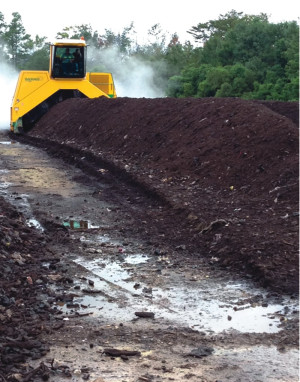BioCycle June 2014
Horry County, South Carolina: Improving Processing To Meet Community’s Compost Demand
Horry County, located in the northeast corner of South Carolina near Myrtle Beach, has a lot of land. And all of that real estate means a lot of grass clippings, leaves, sticks, brush and other landscaping debris. Each year, the Horry County (SC) Solid Waste Authority (HCSWA) composting facility processes 25,000 to 30,000 tons of yard trimmings, all sourced from within the county.
Materials are processed in a grinder before being placed in windrows, which are turned weekly, monitored for temperature, and watered as necessary to maintain proper moisture levels. Total processing time at the Horry County facility is around 60 days, but that time frame can be affected by weather conditions. All finished material is screened to remove plastics before being sold back to the community for $20 a ton. “Our residents come with everything from a five-gallon bucket to a hitch trailer to take the compost home,” explains Bill Hilling, HCSWA’s director and manager of the county’s composting facility.
In 2013, Hilling and facility staff realized that the windrow turner they had been using for almost two decades was becoming outdated. To continue meeting the demands of the community, it was decided that a new windrow turner would be a sound investment. The team began researching various models and opened the bidding process. The decision was made to purchase a Backhus model 17.50. “We did exhaustive due diligence, and visited a number of other sites to see the various options perform in person,” explains Hilling. “We saw the Backhus run a couple of times, and overall our staff was impressed with how that machine delivered.” Because the turner is a tracked machine, it is very effective when operating in wet, muddy conditions. “Our previous turner could get stuck pretty often in the mud, but this machine has no issue at all,” he says.
Crimora, Virginia: Successful Food Scraps Pilot
This spring, Black Bear Composting in Crimora added another university to its list of clients that already includes James Madison University and the University of Virginia. In January, Black Bear Composting began a food scraps collection pilot with Bridgewater College, a liberal arts school with approximately 1,800 undergraduate students. The arrangement is a partnership between Waste Management of Virginia, Black Bear, Bridgewater and Parkhurst Dining, which provides Bridgewater’s dining services. The campus diverted 3,000 to 4,000 lbs of organics weekly during the collection pilot. In the dining halls, pre and postconsumer food scraps were collected in 65-gallon totes by kitchen staff. Black Bear provided initial consultation services to develop a collection strategy and estimate how much food waste would be diverted. It also provided the containers and compostable bags. Material was picked up three times per week.
Collected materials were composted in turned windrows at Black Bear’s facility approximately 20 miles from Bridgewater’s campus. Finished compost, valued at $200 to $300, was donated back to the college to be used on the community garden, hoop house and campus flowerbeds. Contamination in the collected organics was minimal throughout the pilot. Tashome Molalenge, Director of the Center for Sustainability at Bridgewater, hopes the program, which ended in May, will be extended. “We believe programs like these have multiple long-term benefits that include the potential to influence attitudes and behavior regarding sustainability and most specifically waste minimization efforts on campus,” notes Molalenge. Continuation of the project largely depends on collaboration with key stakeholders and cost, which Molalenge hopes will be comparable to traditional waste disposal. “Our strategy is to divert 30 to 45 percent of the waste stream into composting, therefore reducing the cost of waste collection which will pay for a portion of the composting program.”
Borden, Indiana: Wood Recycling And Composting
Koetter & Smith is a wood recycling firm in Borden, founded by Randy Koetter and Sam Smith in 1974 to sell recycled wood shavings to horse owners as stable bedding. As time progressed, the company began recycling other types of wood waste, including tree debris, chips and bark, as well as roll-off boxes of scrap. The company makes a number of specialty products that include equine bedding and dried litter for use in poultry houses, bulk boiler fuels and fuel pellets for heating homes, and landscape mulches. The firm also produces customized compost and soil blends that they retail to a number of markets, including farmers, garden centers and homeowners.
About 15 years ago, Koetter & Smith got into the composting business, more or less by accident. “We had some products that didn’t meet the grade for animal bedding — sawmill residue, yard waste, some manure,” recalls Matthew Smith, chief operating officer. “We left that material outside and it composted over time.” Today, he adds, the firm composts about 30,000 to 40,000 cubic yards (cy)/year of wood waste, most sourced from about 30 sawmills in the region.
Three composting areas on the property total about four acres in size. Two have compacted clay bases, and the other is compacted lime. Converting material into finished compost takes six to eight months, depending on the time of year. A bulldozer is used to turn the piles as needed. When the composting process is completed, the material is further processed using Peterson Model 6710 and 5400 grinders, and a Komptech L-3 star screen. Most material is screened to a half-inch. The final step is two to three weeks of curing before the product is ready for sale. Koetter & Smith’s Soil Mendous line includes a Green Thumb mix comprised of composted rice hulls, pine fines and compost. The firm also sells other mixes that include composted leaves, sands, screened compost, pine fines, rice hulls, Coir and topsoil. “We will mix to the customer’s needs,” notes Smith. Compost is sold in bulk and 40 pound bags.
The major challenge in producing compost is managing the mix of ingredients, he adds, “…since we can’t dictate what material comes in. It’s difficult to get exactly the mix we need, so getting the (composting) ratios right is always a balancing act.”
Dallesport, Washington: Dirt Hugger Transitions To New Site
Dirt Hugger, a Pacific Northwest commercial composting facility that opened in 2010, is in the process of transitioning from a site in The Dalles, Oregon, to Dallesport, Washington, a new location just seven minutes away. The operation was forced to move to make room for development of an industrial park. At its current site, Dirt Hugger takes in 10,000 to 15,000 tons/year of mixed residential yard debris and food scraps, commercial food waste, fruit and fruit processing waste, and liquid brewing feedstocks from the Columbia River Gorge region. The new site is a nine-acre, 26,000 tons/year facility, strategically located close to major expressways but with no immediate neighbors. Designed in conjunction with Green Mountain Technology, it will feature a half-acre in-floor aeration system capable of positive/negative and reversing aeration. Stage One composting will take 14 to 21 days in either windrows (average volume intake) or mass bed ASP (peak volume intake); Stage Two will be turned windrow curing on 4.5 acres of cement-stabilized soil. The entire composting process is expected to take 60 to 90 days. The ASP in-floor aeration will have tanked leachate control while the remainder of the site will drain to high and low aeration leachate ponds.
The total cost for the new site is $400,000, which includes grading, and installation of ponds, the aeration pad, and power and water systems. More than half of that cost, $250,000, will come from bank loans. Dirt Hugger is utilizing three grants (both state and federal) totaling $85,000.














